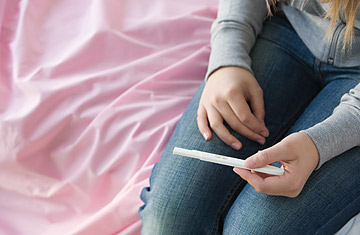
(7 of 14)
The message that contraception is bad is often reinforced by parents, who are loath to admit that their children are sexually experienced. "I went to my mom five different times to see if she could at least get me to a doctor to get me on birth control," recounts Nancee Mason, 19, from Pontiac, Mich., who has a nine-month-old son. "But my mom is the kind of person who, if you mention sex, she turns all red and clams up."
The Reagan Administration has taken steps to make it difficult for teenagers to obtain contraceptives. Since taking office, the President has repeatedly tried to restrict the availability of family-planning services. One-third of the women who seek such services at federally funded clinics are teenagers. In 1983 the Administration further attempted to control teenage access to contraceptives by issuing what quickly became known as the "squeal rule." The regulation required federally funded clinics to notify parents within ten days of prescribing contraceptives to minors. However, the squeal rule was squelched in the courts on the ground that it would have increased unwanted pregnancies and abortions.
Even without the risk of being squealed on, many young girls are embarrassed about going to a public clinic. "I chickened out," confesses Debra Stinnett, 18. "I just never went back to Planned Parenthood for the pills." She now has a one-year-old daughter. Studies show that, on the average, teens wait twelve months after first becoming sexually active before they seek contraception. By then it is often too late. "When you're young," says Kim Adalid, 19, of Lawndale, Calif, a wise old mother of two, "all you think about is the weekend."
When they do become pregnant, many girls simply hide the fact, denying it even to themselves. For Angela Spencer, 16, of Lawndale, reality did not hit home until five months into her pregnancy, when she entered a special school for young mothers. "A lot of the girls had already had their babies," she relates. "When I walked in that classroom, it was like the first time I realized what was happening to me." Unable to grasp their situation, adolescents frequently wait too long even to consider having an abortion. The gravity of such a decision often eludes them. "I was going to have an abortion, but I spent the money on clothes," confesses Sonya Lyde, 18, of Chicago, now the mother of a seven-month-old boy.
According to the most recent statistics, almost 30% of U.S. abortions are performed on teenagers. Abortions seem to be commonest among the affluent. "Upper-middle-class girls look at abortion as a means of birth control," says Myra Wood Bennett, a county health official in southern Illinois. The poorer girls, she notes, simply cannot afford it. Federal funding of most abortions for low-income women was barred by Congress in 1976; only nine states have stepped into the breach, providing for abortions without restrictions.
